| SHADOWS ON THE WALL | REVIEWS | NEWS | FESTIVAL | AWARDS | Q&A | ABOUT | TALKBACK | |||||
 Shadows off the beaten path Shadows off the beaten pathIndies, foreign, docs and shorts...
On this page:
KOKO-DI KOKO-DA |
A WHITE, WHITE DAY |
YOU GO TO MY HEAD
| |||||
| See also: SHADOWS FILM FESTIVAL | Last update 22.Feb.20 | |||||
|
Koko-di Koko-da Review by Rich Cline | 
| |||||
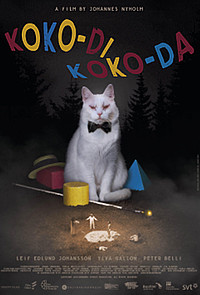 dir-scr-prd Johannes Nyholm with Ylva Gallon, Leif Edlund, Peter Belli, Morad Baloo Khatchadorian, Brandy Litmanen, Katarina Jakobson, Stine Bruun, Martin Knudsen release Swe 23.Aug.19, US 15.Nov.19, UK 27.Mar.20 19/Sweden 1h26  |
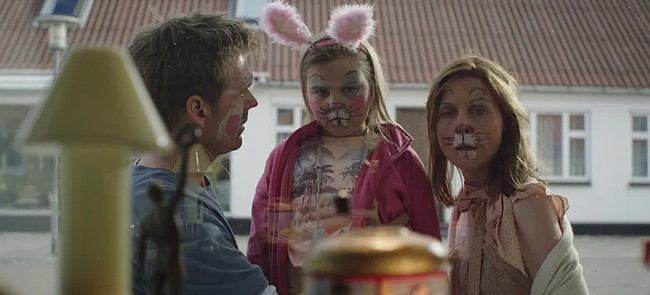 A Swedish fairy tale freakout, this film is perhaps too repetitive and wilfully evasive to properly satisfy an audience. But satisfaction is clearly not writer-director Johannes Nyholm's intention: he wants to unsettle, and then unsettle some more. So as the events spiral into a viciously echoing nightmare, he layers scenes with surreal imagery and moody jolts that may mean something on a larger human scale. Or maybe not. Lively couple Elin and Leif (Gallon and Edlund) are on holiday when their 8-year-old Maja (Jakobson) dies suddenly. Three years later, they are struggling to find equilibrium as they reluctantly take another vacation. Elin is particularly annoyed when Leif turns into a dense woods to find a camp site. Then in the middle of the night, they are attacked by a bizarre trio: song-and-dance man Mog (Belli), hulking strongman Sampo (Khatchadorian) and gun-toting Cherry (Litmanen). They wake to find it was a dream. But it happens again in a different way. And again. And again. It's easy to lose count of how many times the narrative cycles back to add a new angle to Elin and Leif's relationship before plunging them back into this ghoulish Groundhog Day. Even though they learn from each experience, their reactions are increasingly unhelpful. It's not that the villains are a step ahead of them, it's that Elin and Leif have lost the ability to care for each other. The film is staggeringly well shot to elicit uneasy chills at every point, even as it seems to spiral in place. Performances are intriguingly contrasted in this style of storytelling. Gallon and Edlund have a remarkable realism in their relationship, which in the opening scenes with the superb Jakobson is fused with sharp humour. So the pain of grief adds a very heavy weight. And they maintain this earthiness right through the most outrageous scenes. By contrast, Belli, Khatchadorian and Litmanen offer wildly heightened, almost slapstick performances that are both terrifying and viciously amusing. Scenes are peppered with elements that must be symbolic, from the white cat to two dogs (one of which is dead) and a family of rabbits in an eerie light/shade silhouette animation show within the story. Indeed, Elin, Leif and Maja originally appear in rabbit-face makeup. What all of this means is wilfully obscured from the viewer, but there are moments of vivid emotion all the way through the film, as well as a powerful sense of fear. And while it runs to the repeated tune of a child's song, this is definitely not a movie for the kids.
| ||||
|
A White, White Day Hvítur, Hvítur Dagur Review by Rich Cline | 
| |||||
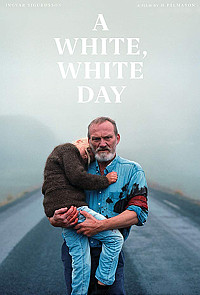 dir-scr Hlynur Palmason prd Anton Mani Svansson with Ingvar Sigurdsson, Ida Mekkin Hlynsdottir, Hilmir Snaer Gudnason, Sara Dogg Asgeirsdottir, Bjorn Ingi Hilmarsson, Elma Stefania Agustsdottir, Haraldur Stefansson, Laufey Eliasdottir, Sigurdur Sigurjonsson, Arnmundur Ernst Bjornsson, Thor Hrafnsson Tulinius, Sverrir Thor Sverrisson release Ice 6.Sep.19, US 28.Feb.20, UK 15.May.20 19/Iceland 1h49 CANNES FILM FEST TORONTO FILM FEST  |
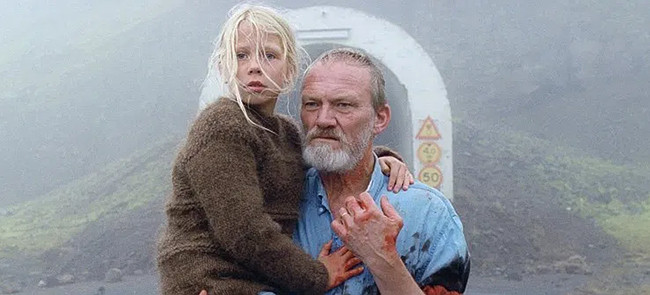 An offbeat, artful exploration of Icelandic angst, this drama about deep emotions takes the viewer into some very uncomfortable situations. Filmmaker Hlynur Palmason pulls no punches as he provokes his central characters to confront their deeply buried grief and fear. This Scandinavian gloom makes the film feel long and often rather grim, but it's gorgeously shot, and the actors bring a bracing complexity to their roles. In a remote town, Ingimundur (Sigurdsson) is a retired policeman who lost his wife (Asgeirsdottir) when her car went off the road in the fog. So he pours his energy into his cheeky 8-year-old granddaughter Salka (Hlynsdottir) while remodelling an unfinished house in a field surrounded by wild horses. When his daughter, Salka's mother Elin (Agustsdottir), gives him a box of his wife's things, he discovers that she was having an affair with neighbour Olgeir (Gudnason), so Ingimundur joins the same football club to keep an eye on him and plot his revenge. The film opens with a quote about white-on-white weather, when the sky and earth merge and the undead begin to speak. Ingimundur has clearly never dealt with his own grief, especially in the glib therapy sessions he has with Georg (Tilinius). So this new obsession with Olgeir brings out some dangerously buried feelings, which ripple to the people who are closest to him. Palmason tells this story in quietly evocative sequences that use a wide variety of camerawork, often almost unnervingly still interrupted by explosive moments. Performances are often unsettlingly naturalistic and understated, creating characters who are mercurial and unpredictable. Each person is grappling with internal issues that feed into his or her behaviour. At the centre, Sigurdsson is fascinating, creating a man who is immediately likeable but becomes more terrifying as layers begin to peel away. This sends Ingimundur's various relationships into some frightening directions. The question is whether he's still likeable, or maybe he's a villain now. Palmason's filmmaking is rhythmic and moody, never very easy on the audience, especially with the narrative's whiplash emotional turns. From extended silent sequences to offhanded family gatherings to a deliberately scrappy brawl, it's impossible to predict what might happen next. But audience members who click into the film's unusual pace will definitely want to know where it's going, mainly because these warring emotions exist inside all of us. Palmason doesn't offer answers, but he reminds us that we're not alone.
| ||||
|
You Go to My Head Review by Rich Cline | 
| |||||
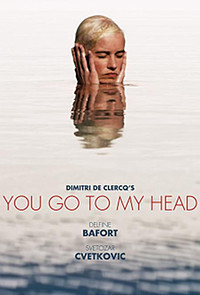 dir-prd Dimitri de Clercq scr Dimitri de Clercq, Pierre Bourdy, Rosemary Ricchio with Delfine Bafort, Svetozar Cvetkovic, Arend Pinoy, Omar Sarnane, Laurence Tremolet, Abdel Jalil Zerououl, Hamza Sarnane, Jmiaa El Hlali release UK Oct.18 cff, US 14.Feb.20 17/France 1h56 |
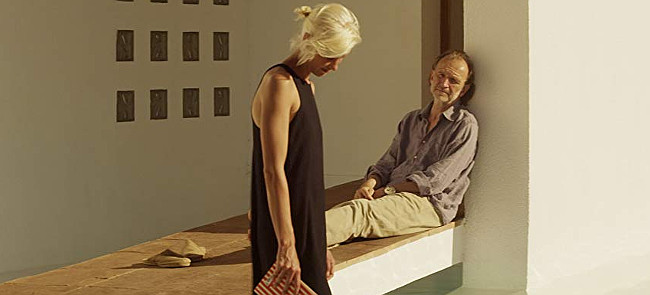 There's an emotive, jazzy tone to this mystery thriller, shot for maximum impact in dramatic locations in Morocco. In a Hitchcockian tale of confused identity, filmmaker Dimitri de Clercq also indulges in meandering sequences while continually stripping his lead actress naked. There's a nicely enigmatic approach to storytelling here, but some properly developed intrigue might have made the film more compelling. After a car crash in the desert, Dafne (Balfort) is unable to remember anything about herself or the injured man (Pinoy) she was travelling with. Walking aimlessly, she's found by architect Jake (Cvetkovic), who tells her that he's her husband. After the doctor (Zerououl) tells him she may never regain her memory, Jake sets out to build up her sense of self. He also starts calling her Kitty, easily answering her many questions while also behaving rather suspiciously. And as Dafne looks for proof of her identity, she begins to wonder what's true. The filmmaking is eerie and elusive, with dramatic settings and a haunting score by Hacene Larbi. It's obvious that Jake is deceiving Dafne, so the mystery is how and why. Is he using her to replace someone, Vertigo-style? Or is there more to their story that the script will only reveal when it's good and ready? De Clercq keeps the pacing slow and steady, with hesitant conversations and facts that often seem misleading. The problem is that this keeps the characters from coming to life as people we can identify with. Bafort has a vivid presence, even though she barely says a word in the first half-hour. There's a strong sense that Dafne's mind is spinning as she puts her life together, and that her hazy memories are ringing alarm bells. Cvetkovic cleverly plays the enigmatic Jake as a nice-guy hero while hinting at other motivations. He certainly never comes across as a villain, as the actor evokes true motives and some deeper feelings that drive his action. This does create some sympathy for Jake's inner pain. Because of its relentless vagueness, the plot drags badly over its extended running time, especially in the final act. Some twists or revelations along the way would have helped keep attention levels higher. Instead, the film takes a more artful approach, maintaining Dafne's perspective as she struggles to work out what, if anything, is true about her life. But there's little in here that the audience can grab onto, which leaves this finely crafted and acted film feeling rather thin.
| ||||

See also: SHADOWS FILM FESTIVAL © 2020 by Rich Cline, Shadows
on the Wall
HOME | REVIEWS | NEWS | FESTIVAL | AWARDS
| Q&A | ABOUT | TALKBACK | | ||||

